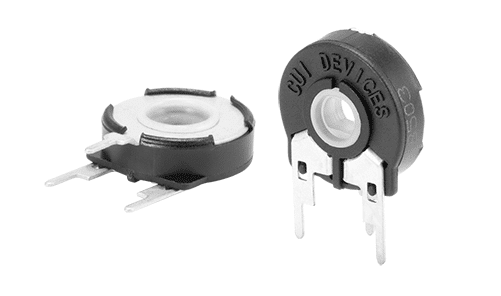What is a Potentiometer?
A potentiometer is a variable resistor used to make precise voltage and current adjustments in a circuit. It contains:
Resistive Element: A stationary resistor, typically a carbon or wire-wound material.
Wiper: A sliding or rotating contact that traverses along the resistive element.
Terminals: Three electrical terminals—two which are attached to the ends of the resistor and one attached to the wiper.
By varying the wiper, one can regulate the output voltage, which makes potentiometers indispensable in signal calibration and electronic control systems.
Types
Potentiometers exist in various forms depending on their operation and design. Below are the most popular forms:
1. Rotary Potentiometers
- Most widely used form, with a rotating knob for varying resistance.
- Used in volume control knobs on radios, amplifiers, and TVs.
2. Linear Potentiometers (Slide Pots)
- A sliding mechanism shifts the wiper along a straight path.
- Usually employed in audio mixers, industrial equipment, and control panels.
3. Digital Potentiometers
- Electronic signals are utilized rather than mechanical movement.
- Utilized in microcontroller-based circuits, including digital volume controls and signal processing circuits.
4. Multi-Turn Potentiometers
- Multiple turns are needed to achieve fine-grained resistance control.
- Employed in precision equipment such as laboratory devices and industrial control systems.
5. Trimmer Potentiometers (Trimpots)
- Tiny, variable parts employed for calibration in circuits.
- Used on circuit boards in electronics that need precise resistance adjustments.
How Does a Potentiometer Work?
A potentiometer is a voltage divider. When powered, the wiper travels along the resistive path, varying the output voltage between the two terminals.
For instance, in a volume knob of a volume control knob, rotating the dial varies the resistance, which adjusts the output signal to the speakers. Less resistance corresponds to higher volume, and more resistance corresponds to lower volume.
Applications of Potentiometers
Potentiometers find numerous applications across various industries and household devices. A few of their typical applications include:
1. Audio Control
- Applied in radios, speakers, and amplifiers to control sound volumes.
- Rotary potentiometers adjust volume by altering electrical signals.
2. Lighting Control
- Used in smart lighting systems and dimmers to regulate brightness levels.
3. Industrial Machines
- Utilized in control panels, CNC machines, and robotic machines for accurate movement and resistance tuning.
4. Automotive Industry
- Used in automobile throttle position sensors, where they assist in fuel injection system control.
5. Medical Devices
- Utilized in X-ray equipment, hearing aids, and medical equipment to precisely adjust voltage and resistance.
6. Measuring Instruments
- Aids in small voltage variation measurements in electronic testing devices.
7. Gaming Controllers
- Used in gaming consoles and joysticks to change sensitivity and motion control.
Benefits of Potentiometer Use
Potentiometers have various advantages that make them an integral part of electrical and electronic systems:
✅ Easy & Affordable – Convenient to operate and low cost for most applications.
✅ Smooth & Precise Control – Smooth resistance adjustments with accuracy.
✅ High Number of Applications – From audio systems to medical equipment.
✅ Durable & Reliable – Can last for years with minimal wear.
Choosing the Right Potentiometer for Your Needs
When selecting a potentiometer, consider:
✔ Resistance Value – Choose based on the required voltage control range.
✔ Power Rating – Ensure it can handle the expected current without overheating.
✔ Mounting Type – Decide between through-hole, surface mount, or panel-mounted options.
✔ Durability – For industrial use, opt for wire-wound or sealed potentiometers.
If you are building a circuit, a digital potentiometer can be a more suitable choice if you require software control.

